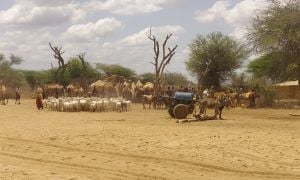
Read our 2024 annual report

Knowledge Hub
Environment-friendly technologies with eco-stoves in Liberia
Liberia is especially vulnerable to climate change. Environmental issues include high levels of rainforest deforestation through timber extraction companies; a widespread use of traditional slash and burn methods by farmers eroding natural forests; rising costs of charcoal and a growing number of health issues linked to excessive smoke exposure from conventional open cooking fires, especially amongst women.
The Concern Liberia country programmes, primarily focus on multisectoral, integrated food and nutrition security, addressing the root causes of hunger and malnutrition through coordinated support across multiple sectors including agriculture, health, water and sanitation, and gender equality.
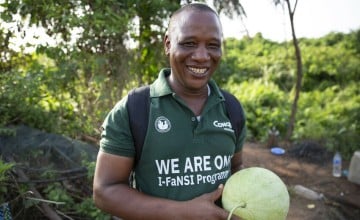
Funded by Latter-Day Saints, Improving Food and Nutrition Security through Sustainable Agricultural Interventions (I-FaNSI) Phase 4 was a 1-year programme (November 2024 to October 2025) implemented by Concern Liberia in Buchanan district, Grand Bassa county across 48 communities.
I-FaNSI’s overall goal was to improve the food and nutrition security of 3,750 poor and vulnerable individuals, reaching 12,750 people indirectly. To promote community ownership, the programme was working to transform the existing Community Savings and Loan Associations (CSLAs), supported under I-FaNSI phases 1 to 4, into a cooperative. This transition aims to improve production and position the cooperative for stronger bargaining, marketing their products both in and out of Buchanan city.
The programme was designed to create a lasting and positive impact on its participants and their communities while promoting socio-economic and environmental sustainability. Through the adoption of climate-smart agricultural techniques, market systems development, and gender mainstreaming, I-FaNSI sought to enhance women’s leadership, strengthen household unity, and improve the use of productive resources within communities.
In order to achieve these goals, the following objectives were established:
- Improved Diversified Food Production.
- Strengthened Innovative Financing Schemes for Farming Groups.
- Improved Maternal, Infant, and Child Nutrition Practices.
- Strengthened Partnerships, Linkages, and Coordination among Local Actors.
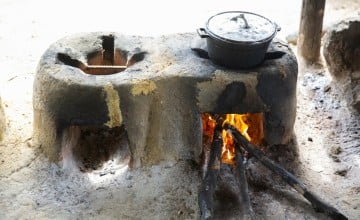
In Liberia, with a lack of affordable alternatives for cooking, especially in the urban areas such as Buchanan; a shortage of reliable electricity and low-cost cooking gas, the dependence on importing wood and charcoal from the rural counties not only impacts deforestation but increases the price and scarcity of both materials. According to the 2016 Household Income and Expenditure Survey (HIES), 95% of households rely on charcoal and firewood for cooking and heating whilst only 2% have access to clean cooking fuels and technologies.
Currently, approximately one-third of the global population (2.7 billion people) lack access to clean cooking facilities and depend on solid fuels such as wood and crop residue for cooking. Traditional cooking methods results in exposure to household air pollution which was responsible for an estimated 3.2 million deaths in 2020, including over 237,000 children under 5.
Unsustainable charcoal production and fuelwood collection are currently the leading causes of forest degradation, particularly in sub-Saharan Africa. Within urbanized areas in sub-Saharan Africa, the poorest households can spend up to 20% of monthly income to buy traditional cooking fuel. While in rural areas, women and children devote many hours to procuring firewood, leaving them exposed to sexual assault, animal attacks and injuries.
The I-FaNSI’s ‘sister’ programme; Livelihood, Innovation, Food Security and Entrepreneurship (LIFE), first piloted an eco-stove initiative during 2023 and 2024 through its climate allocation component. The pilot targeted Mothers Groups in District 3 of Grand Bassa and Rivercess counties to help reduce smoke inhalation and the excessive use of firewood during cooking. Staff working with these groups reported that women often travelled long distances to collect firewood, which burned quickly when using traditional three-stone fires.
With the positive acceptance of the eco-stove technology in the LIFE pilot communities, inspired its replication in Buchanan, under objective 3 of the I-FaNSI programme. A needs assessment, conducted in 2024, identified eco-stoves as the most suitable energy-efficient cooking solution for the 10 new Buchanan communities under Phase 4, simultaneously improving nutrition practices.

The Function
The eco-stoves are locally fabricated using locally available materials; clay and palm chaff. These create a heat retaining structure which maximises fuel efficiency while reducing smoke emissions. The multi-fuel design allows the user to choose from either timber or charcoal, although a lesser amount of both materials is used in comparison to the traditional stove.
20 Mothers Group Leaders, comprising of Chair ladies and Co-Chairs from the 10 communities attended a 10 day ‘Training of Trainers’, which included modules on:
- Positive environment management and climate adaptation.
- Risks of traditional cooking methods and the benefits of clean cooking.
- Hands on fabrication and maintenance of eco-stoves for personal and community use.
The trainers subsequently cascaded the training to their respective Mother Support Groups, promoting community ownership and ensuring scalability.
The eco-stove training focused on local production as opposed to the commercialized eco-stove, which would require market linkage and therefore budget implications. The training also enhanced behavioural change with trainers cascading knowledge to their respective Mother Support Groups, promoting community ownership and scalability.
To ensure sustainability, the training also included general maintenance of the eco-stove, including the reinforcement of clay; as stoves are made from local materials if they get damaged, they are easily repairable. During these cascaded training sessions, women provide their own materials and often provide the trainer with a voluntary donation for their time.
Before I-FaNSI, I relied on traditional cooking methods that were time-consuming, inefficient, and harmful to both my health. I didn’t even know. Since adopting the eco-stove, I have experienced a remarkable improvement in my daily routine. The stove uses less firewood, and my health is less at risk.
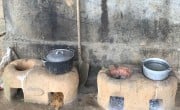
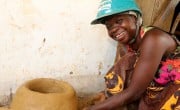
The Impact
The simple yet innovative eco-stove intervention is having a significantly positive impact on the communities in Buchanan, encouraging female empowerment and improving health and living conditions.
- Production and adoption
Following the training sessions, between November 2024 and August 2025, a total of 234 eco-stoves were replicated across the 10 communities. Community level meetings and radio talk shows supported the adoption of the stove, encouraging questions and overall awareness of the new cooking method as well as the climate implications.
The intervention has already visibly improved health and environmental benefits as well as providing a practical and sustainable solution to cooking for households. The eco-stoves have helped to reduce smoke emission and exposure, lowering the health risks from air pollution with an estimated 80% of the 1,100 households adopting this new cooking intervention. The decision of the remaining 20% of households not to adopt the use of the eco-stove is due to the urban programme setting in which some households have tiled kitchen floors as opposed to mud and therefore deemed unsuitable.
- Health, environmental and socioeconomic impact
The communities have reportedly seen a reduction in deforestation on the outskirts of Buchanan city (where wood can be found) as they no longer need to use the same quantity of firewood when cooking. This is easing the physical burden on women and girls who are traditionally responsible for collecting this and increasing productiveness in their day. Women are now able to focus on their education or use the eco-stoves for business purposes, fostering economic empowerment for individuals who aspire to be entrepreneurs.
In a recent impact assessment conducted by the Concern Libera monitoring team, it was confirmed that firewood usage in the 10 communities has reduced by approximately 50%, whilst health outcomes have improved at about 70% with limited eye irritation, and smoke-related respiratory issues and hair loss among users.
I find this local eco-stove durable and a great way to make income. I wish to start educating other communities on the local stove.
Concern’s Environment Policy as mentioned in the organisation’s Strategic Plan 2021-2025, makes a commitment to sustaining the natural environment as a means of protecting the foundation of the livelihood of many of the poorest people in the world. This is done through country programme activities such as supporting communities and local institutions on positive environment management, community resilience and climate adaptation. These are all essential with the potential risks associated with climate change in Liberia, particularly increasing temperatures.
For Phase 5 of the I-FaNSI programme, the eco-stoves champions will assist in the practical training of new champions. Key recommendations for future implementation include the expansion of production and distribution to additional communities; strengthening the training and monitoring of Mothers Group Champions, adoption of the stove design for urban households and the promotion of market-based models to ensure sustainability and economic opportunities.


